Regulation D: Were You Sold an Unsuitable Private Placement?
 When many people think of the word “investment,” frequently the first thing comes to mind is stocks that are traded on an exchange like the NYSE. But investments can encompass a wide range of different financial products that may or may not be publicly traded.
When many people think of the word “investment,” frequently the first thing comes to mind is stocks that are traded on an exchange like the NYSE. But investments can encompass a wide range of different financial products that may or may not be publicly traded.
Private placements are one such investment. They’re used by startups and companies who need to raise cash but aren’t interested in the structure of an initial public offering, or IPO, utilizing hedge funds.
But private placements aren’t subject to traditional SEC registration because they aren’t publicly traded on a national exchange. Regulation D allows private placements to be offered without the same amount of regulation required with other securities.
Initially intended for institutional investors and others to invest in high risk startups and other companies, wall street has used private placement offerings to sell high risk investments to retail investors in large quantities. One reason for the rise in private placements is the high commissions brokers are paid for selling these products. As commissions on traditional stocks and bonds have decreased in recent years, these complex products also come with complex fees and commissions which can go to the brokerage firm’s bottom line.
What Is Regulation D?
Under Regulation D of the Securities Act of 1934, private placements are exempt from most of the regulations that govern publicly traded securities.
Rather than registering, companies file a Form D online with the SEC after the sale of their first security. Instead of a registration, it’s a notice with basic information about the company, including:
- The names and addresses of the company’s promoters
- The executive officers and directors
- Some detailing of the offering itself
The SEC’s EDGAR database is available and can show you whether the company has filed a Form D.
Is A Private Placement Suitable?
The SEC has specific rules regarding these types of private placements under Regulation D, In particular, not everyone is eligible or suitable for a private placement.
Your investment advisor may recommend a private placement to you. But these types of investments are generally reserved for institutional investors and accredited investors. These are investors who not only understand the type of investment and the risks involved, but those who can also afford to lose their investment and fully recover from the loss.
Institutional investors hold a wide range of investments of different types. But a small loss to an institutional investor could be a major loss to an individual.
An accredited investor is one who:
- Is sophisticated and experienced enough in the world of investing to understand these private placements
- Has earned income of $200,000 in each of the two prior years, or $300,000 with a spouse or “spouse equivalent,” and can expect to earn the same amount this year
- Has a net worth of $1 million or more with the spouse or “spouse equivalent, their home’s value and loans attached to it notwithstanding
- Is a broker or other financial professional holding certain certifications, designations, or credentials in good standing, i.e., a Series 7, 65, or 82 license.
Private placement investments are also generally illiquid, meaning you would have to hold onto them for the duration. There is no market to sell them should you decide to, and a return on that investment could take many years. That’s why an investor should be able to afford and absorb the loss of the investment.
Did Your Financial Advisor Do Adequate Due Diligence?
Because the rules are much looser around private placements, there are some who utilize Regulation D to get away with perpetuating a fraud. But not all private placements are necessarily fraudulent, either.
Legitimate private placements have prominent disclosures that are required on offering documents, certificates and other instruments related to the placement. These legends should disclose that the investment is not registered with the SEC and that there are restrictions on any transfers. If those documents are missing, consider this a “red flag.”
As with any investment, a financial advisor is required to perform adequate due diligence before recommending it to an investor. If a financial advisor recommends the investment, they have a duty to disclose all material risks of the investment. Also, the financial advisor should take into consideration the investor’s portfolio, risk tolerance, and investment objectives.
Because private placements are not subject to the same investor protection laws, an issuer is only required to provide a limited amount of disclosure to potential investors. Rather than promoting these illiquid investments as being safer than a traditional stock or bond, advisors must consider that the investment cannot be easily sold or is not fairly compensating the investor for the risk they are taking.
Your state’s securities regulator may have more information about the company and individuals involved.
Did Your Financial Advisor Recommend Private Placements?
Silver Law Group represents investors in securities and investment fraud cases. Our lawyers are admitted to practice in New York and Florida and represent investors nationwide to help recover investment losses due to stockbroker misconduct. If you have any questions about how your account has been handled, call to speak with an experienced securities attorney. Most cases are handled on a contingent fee basis, meaning that you won’t owe us until we recover your money for you. Contact us today at (800) 975-4345 and let us know how we can help.
 Securities Arbitration Lawyers Blog
Securities Arbitration Lawyers Blog

